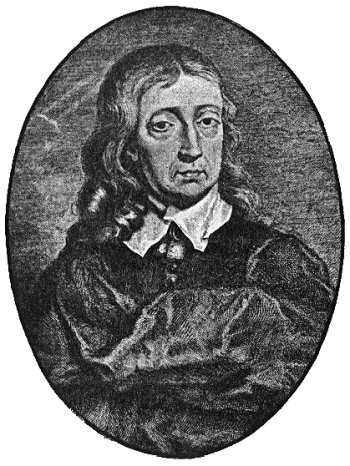









|
Chapter Four English Literature of the Seventeenth Century
I. John Milton (1609-1674)
1. Life
 John Milton was born on Bread Street in central London on 9 December 1609.
He was educated at St. Paul's School, where he was a deeply serious student.
In 1625 Milton was admitted to Christ’s College of
Cambridge University,
from which he received a bachelor’s degree in 1629 and a master’s degree in
1632. Ordinarily, these degrees would have prepared their holder for
ordination in the Church of England, but Milton held back from that
commitment for dislike over the direction in which this institution seemed
to be heading. For the next six years, instead, he resided with his parents,
continuing his educational program, which amounted to reading virtually
everything every written in the western languages. In 1638 he undertook a
tour of the continent, where, particularly in Italy, he made the
acquaintance of major European intellectuals.
John Milton was born on Bread Street in central London on 9 December 1609.
He was educated at St. Paul's School, where he was a deeply serious student.
In 1625 Milton was admitted to Christ’s College of
Cambridge University,
from which he received a bachelor’s degree in 1629 and a master’s degree in
1632. Ordinarily, these degrees would have prepared their holder for
ordination in the Church of England, but Milton held back from that
commitment for dislike over the direction in which this institution seemed
to be heading. For the next six years, instead, he resided with his parents,
continuing his educational program, which amounted to reading virtually
everything every written in the western languages. In 1638 he undertook a
tour of the continent, where, particularly in Italy, he made the
acquaintance of major European intellectuals.
Upon his return to England Milton threw himself into the
disputes of the time, taking the side of the Parliament against the
assertion of monarchical rights made by
Charles I , and writing numerous
pamphlets for this cause. He married in 1642, but his wife Mary Powell soon
thereafter returned to her Royalist family home. She returned to her husband
in 1645, the year in which Milton established himself as a poet with
publication of his Poems. From this point forward, however, the
stresses of the Civil War occupied Milton’s mind. With the capture and
public execution of Charles I in 1649, a Commonwealth was formed in which
Milton took the position of Secretary for Foreign Tongues to the Council of
State, in effect the Secretary of State to the republican regime led by
Oliver Cromwell. Milton held that position through the life of the
Commonwealth, sacrificing his poetic career and his eyesight in the process.
His first wife died in 1652; he married Katherine Woodstock in 1656, but she
also died two years afterwards. Later in 1658 Cromwell too died, leaving
Milton in both personal and public shock. With the collapse of the
Commonwealth Milton’s political position became truly precarious, and he was
forced into hiding for over a year before he was discovered and imprisoned.
He was saved by the intercession of major cultural figures, including Andrew
Marvell. With the restoration of
Charles II in 1660, Milton thereafter
prudently devoted himself to his poetry. Paradise Lost was published
in 1667, followed by Paradise Regained and Samson Agonistes in
1671. In the summer of 1674 Milton published a second edition of Paradise
Lost. restructured from its original ten books to the twelve books we read
today. On November 12 of that year he died in London
2. Literary Career
Milton’s literary career could be divided into three
periods. The first period ended in 1641, during which he wrote his early
masterpieces “ L’Allegro” and “Il Penseroso” (1632). These poems that were
written at Harton shaved him a true offspring of the Renaissance and a
scholar of exquisite taste and rare culture. He then wrote a masque Comus
in which his idea of
Puritanism appeared. He also published an elegy
“Lycidas” to mourn for his dead classmate, Edward King. This elegy was
written in classical pastoral form with many allusions. Lycidas that was a
god’s name was referred to Edward King.
From 1641 to 1654 is his second period, during which the
Revolution progressed like a raging fire and the Puritan was in a complete
ascendancy. In 1641 he began to write pamphlets to defend the Revolution. He
sacrificed his poetic ambition to the call of the liberty for which Puritans
were fighting. There were many forceful political essays and pamphlets, such
as The Reason of Church Government (1642), Education (1644),
Areopagitica (1644), The Defence of the English People (1651),
The Second Defence of the English People (1654) etc. In these pamphlets,
Milton either argued for religious and press freedom and against the
authority of the bishops in church government, or defended the Commonwealth
and aroused people’s patriotism.
The third period is from 1655 to 1671, which is usually
considered as the greatest in his literary life. He wrote two epics
Paradise Lost (1665), Paradise Regained (1667), and a tragedy
Samson Agonistes (1671), together with some notable sonnets, such as,
“To Mr. Cyriack Skinner Upon His Blindness”, “On His Deceased Wife” (1658).
The two epics and the tragedy that were more important all drew their
subject matter from the Bible. Although Milton was under persecution after
Restoration, these works demonstrated his firm fighting spirit for freedom
and against tyranny. We could find humanism and Puritanism merged
magnificently in these works that were written in exquisite marvelous
skills.

|
![]()
![]()